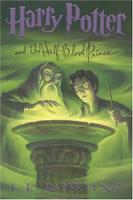I haven't felt very "into" Harry Potter in a while-- I think that maybe after I finished reading the last book, I felt like I was done; I found it to be a satisfying conclusion to a good series. When "The Deathly Hallows Part 1" movie came out last fall, I wasn't excited about it and I didn't actually end up seeing it until just a few weeks ago. But I guess the enthusiasm of other Harry Potter fans and seeing a few of the later movies again was contagious and got me back into it. So, I decided to re-read the last two books in the series, leading up to seeing the last movie, and I'm glad that I did. This is the book where we, with Harry, learn who Voldemort really is, and how the boy Tom Riddle became the fearsome Lord Voldemort. And we also get to see a bit more human and vulnerable Dumbledore.
When Harry first sees Dumbledore in this book, Dumbledore has a withered, dead hand; by the end of the book, we know basically what happened, but we don't get the full explanation (including Dumbledore's mistake) until near the end of Deathly Hallows. As Dumbledore tells Harry, since he (Dumbledore) is "rather cleverer than most men, my mistakes tend to be correspondingly huger." Among the many other intrigues and plots of this book, we see the relationship between Dumbledore and Harry more clearly than before. Harry confirms to the Minister of Magic that he is "Dumbledore's man through and through"; and near the end, when Dumbledore and Harry are leaving the cave where Voldemort's horcrux had been stored, a weakened Dumbledore says he is not worried because he is with Harry - rather the way Harry has always felt safe when he was with Dumbledore.
Throughout the book, as Harry learns more about Voldemort, he learns about horcruxes and a bit about how magic and evil affect the soul. As Slughorn told a younger Tom Riddle, "the soul is supposed to remain intact and whole. Splitting it is an act of violation, it is against nature" - an act of evil such as murder "rips the soul apart." And we see a bit here of what will becomes even clearer in the last book, the short-comings and misunderstandings that Voldemort has. As a young man, he asks Slughorn: "wouldn't it be better, mank you stronger, to have your soul in more pieces...?", clearly not understanding what Slughorn has just told him about the soul being meant to stay whole. In fact, Dumbledore first begins to suspect what Voldemort has done because of the episode with Riddle's diary in the Chamber of Secrets - in Dumbledore's words, Voldemort was "remarkably blasé about that precious fragment of his soul" (using it as a weapon, instead of keeping it safe and protected); and Dumbledore later comments that Voldemort's lack of humanity seems only to make sense in light of this "mutilation" of his soul. Voldemort clearly doesn't think his soul is all that precious, and his horcruxes are valuable to him only as an insurance policy against death, not because they carry a portion of his soul. I find all this talk of souls fascinating, and it seems that some of the notions translate beyond the magical world of Harry Potter - because it makes sense to me that acts of evil would mutilate a person's soul, and that continued soul-mutilation could make a person less human and more carelessly violent. It's interesting to think about, and consider how precious a soul is.
Of course, I haven't even written about the main plot - and title - of this book! The fascinating, conflicted character of Snape; the brilliant Half-Blood Prince, who had a mastery of potions that improved on the standard textbook, clever and talented, but also with a mean streak and capable of nastiness. And also the tortured, desperate Malfoy. It's interesting reading this book again, after having read Deathly Hallows, because so much of what is going on in this book - and in Snape's case, an undercurrent and thread running through the entire series - is not explained until the end of the series. I think it may make the end of this book a little less satisfying in a way (although it can stand on its own to a certain extent); reading it again definitely leaves me wanting to (re-)read the next one soon.
| Title: | Harry Potter and the Half Blood Prince |
|---|---|
| Author: | J. K. Rowling |
| Date published: | 2005 |
| Genre: | Young Adult Fantasy |
| Series: | Harry Potter |
| Number of pages: | 652 |
| Notes: | third reading |



0 comments:
Post a Comment